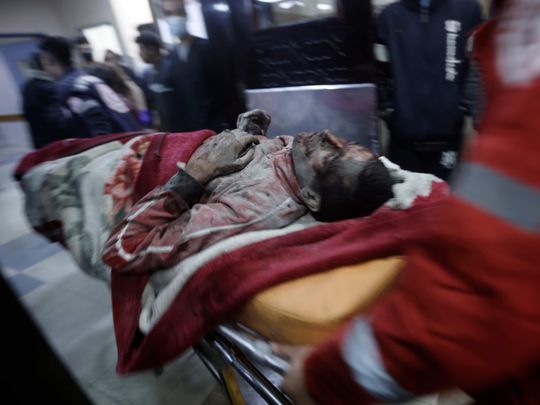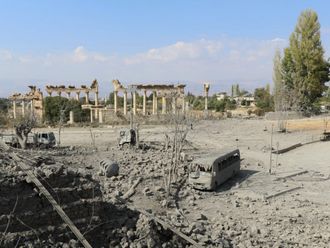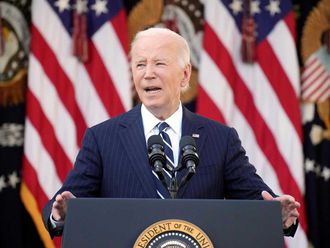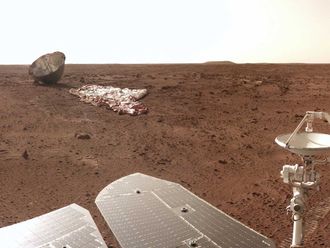
JERUSALEM: Israel and Hamas announced a deal on Wednesday allowing at least 50 hostages and scores of Palestinian prisoners to be freed, while offering besieged Gaza residents a four-day truce after weeks of all-out war.
The first major diplomatic breakthrough in the conflict follows weeks of painstaking negotiations brokered by Qatar with help from Egypt and the United States, and is also intended to allow the delivery of desperately needed food, medicines and fuel to the 2.4 million civilians trapped in Gaza in increasingly dire conditions.
Also read
- Echoes of the Ages: Gaza has an untold history beyond the headlines
- Israel, Hamas agree on four-day truce, hostage release and humanitarian aid into Gaza
- Truce deal raises hopes of freeing hostages in Gaza and halting worst Mideast violence in decades
- BRICS Summit: UAE reiterates calls for protection of civilian lives, immediate ceasefire in Israel-Gaza conflict
Israeli Prime Minister Benjamin Netanyahu’s cabinet approved the truce accord early Wednesday after a near-all-night meeting, in which he told ministers this was a “difficult decision but it’s a right decision”.
The deal is crafted to take effect in stages that the mediators hope can be extended and broadened. Here is what we know so far.
Mediator Qatar to announce start
Qatar said it would announce the start of the four-day humanitarian pause in Gaza, during which Palestinian prisoners will be released in exchange for 50 of the hostages Islamist militants hold in Gaza.
“The starting time of the pause will be announced within the next 24 hours and last for four days, subject to extension,” Qatar’s foreign ministry said in a statement.
“The agreement includes the release of 50 civilian women and children hostages currently held in the Gaza Strip in exchange for the release of a number of Palestinian women and children detained in Israeli prisons,” it said.
Qatar said the deal would include “the entry of a larger number of humanitarian convoys and relief aid, including fuel designated for humanitarian needs”.
‘Truce can be extended’
Qatar’s foreign ministry spokesman Majed Al Ansari told AFP the release of 50 hostages held by Hamas would be staggered over the four-day truce.
“The truce begins and then every day within the four days we will have a number of hostages coming out... and that number should reach 50 by day four,” he said.
The expectation was that the initial 50 women and children hostages freed by Hamas would be followed by further releases to extend the initial four-day truce.
“If by then the Palestinians can commit to an additional number, then the truce can be extended,” Ansari said.
During the period hostages are moved, Israeli reconnaissance of Gaza will be put on temporary hold, said the spokesman, who is also a key adviser to Qatar’s prime minister.
Scope of deal
Although Qatari mediators held out hope the truce deal could lead to a more durable ceasefire, Israeli officials stressed that they intended to resume their campaign to eliminate Hamas as soon as the hostage releases are over.
In a statement, the Israeli government pledged to “continue the war in order to return home all of the hostages, complete the elimination of Hamas and ensure that there will be no new threat to the State of Israel from Gaza”.
Ahead of the crunch meeting which approved the deal, hawkish Defence Minister Yoav Gallant said he had won assurances it would not spell the end of the war.
“Immediately after we have exhausted this phase” he said, security operations would “continue in full force”.
Who will be freed?
An estimated 240 hostages were abducted by Hamas in its shock October 7 attack that killed around 1,200 people in southern Israel but just 50 are to be freed in the initial phase of the truce.
Qatar said those earmarked for staggered release were all children or female civilians.
“There are no military prisoners among those to be released,” its foreign ministry spokesman said.
A senior US official said three Americans, including three-year-old Abigail Mor Idan, were among the 50.
Aid ‘surge’ planned
Large parts of Gaza have been flattened by thousands of air strikes, and the territory is under siege, with minimal food, water and fuel allowed in.
EU chief Ursula von der Leyen said she had ordered a surge in aid deliveries to Gaza following the announcement of the four-day pause in fighting.
“The European Commission will do its utmost to use this pause for a humanitarian surge to Gaza,” she said.











